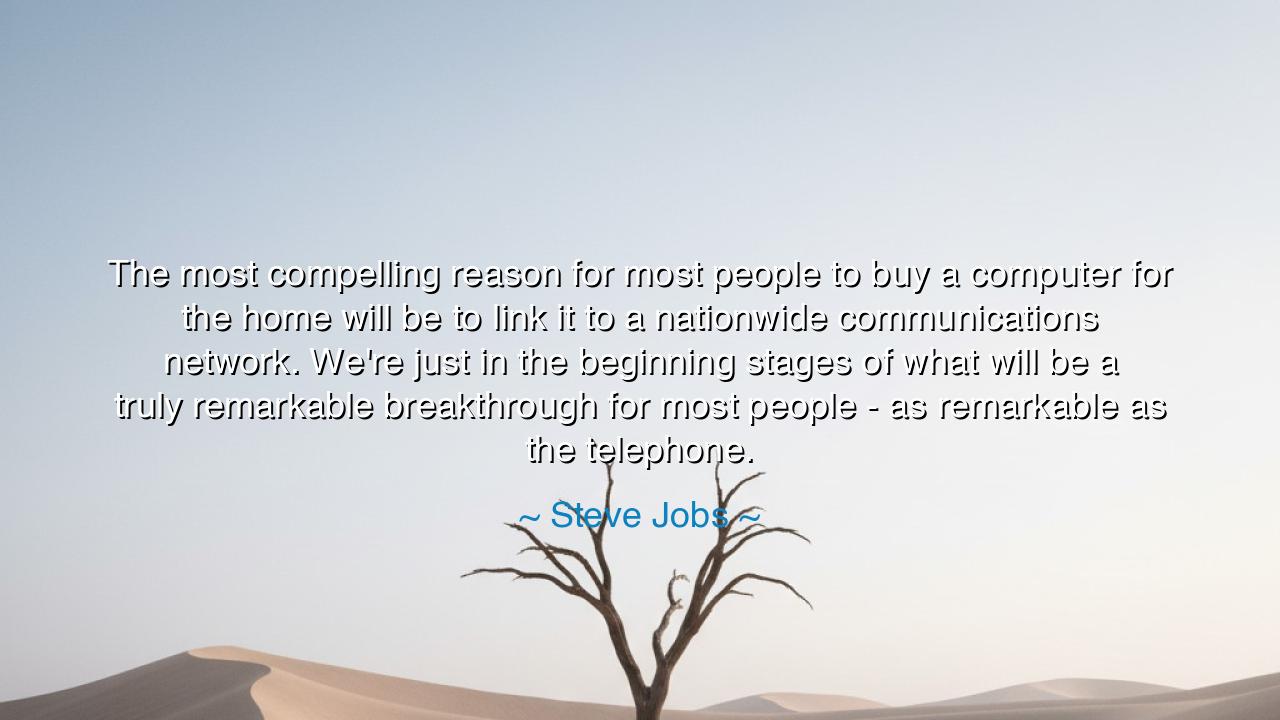
The most compelling reason for most people to buy a computer for
The most compelling reason for most people to buy a computer for the home will be to link it to a nationwide communications network. We're just in the beginning stages of what will be a truly remarkable breakthrough for most people - as remarkable as the telephone.






In the unfolding march of human progress, there are moments when the world is poised on the edge of something revolutionary, when the tools we create begin to change the very fabric of existence itself. Steve Jobs, in his visionary statement, "The most compelling reason for most people to buy a computer for the home will be to link it to a nationwide communications network. We're just in the beginning stages of what will be a truly remarkable breakthrough for most people - as remarkable as the telephone," points us to the heart of a transformation that would shape the future of communication, knowledge, and connection. In these words, Jobs captures the essence of the digital revolution—that what we are witnessing is not merely a technological shift, but a new era of human connection.
In the ancient world, communication was often a slow and laborious process, reliant on the messengers and carriers who traversed dangerous lands to deliver word from one place to another. The great empires, from Rome to Persia, invested vast resources into building systems that could carry messages across great distances, but these systems were often limited in reach and speed. The invention of the telegraph in the 19th century, followed by the telephone, was nothing short of miraculous—it brought the world closer together, compressing time and space in ways that were once inconceivable. Jobs foresaw that the computer, paired with a nationwide network, would carry this transformation even further, creating a web of connection and communication that would empower individuals and communities in ways they had never known.
Socrates, the ancient Greek philosopher, once said that "The unexamined life is not worth living." He believed that the pursuit of knowledge, the exchange of ideas, and the dialogue between individuals were the highest forms of human endeavor. What Socrates could never have foreseen was the digital dialogue that would emerge thousands of years later—a dialogue not bound by the physical limitations of time and place, but one that transcends borders and reaches across continents. Jobs, in his foresight, understood that the computer would be the vehicle through which this new age of knowledge would flourish. It would enable people to not just receive information, but to engage with it, to share it, and to expand it. What Socrates championed in conversation, Jobs envisioned as the digital dialogue of a connected world.
Consider the moment when the telephone was first introduced. The world was astonished, and yet the telephone was more than just a new invention—it was a gateway to a new way of relating to each other. The telephone, like the telegraph before it, compressed time and space, making communication instantaneous. But its true power lay in its ability to break down the boundaries of distance, enabling humans to reach across vast expanses of land and connect as never before. In the same way, Jobs saw that the computer, when linked to a nationwide communications network, would become the new telephone—a tool not just for information, but for connection and collaboration on a scale the world had never seen. The Internet, like the telephone before it, would change how we live, work, and relate to one another.
The lesson embedded in Jobs's words is one of vision and progress. The telephone, which once seemed like a miracle, now seems almost mundane—a tool so deeply embedded in our lives that we take it for granted. Yet, Jobs reminds us that each leap forward in technology is not just about improving efficiency or convenience; it is about changing the way we experience the world. The computer, when linked to the network, is not merely a tool for work or entertainment; it is the gateway to a global community—a place where knowledge, ideas, and dreams can be shared, expanded, and transformed.
In practical terms, this means that we must embrace technology not as a cold, mechanical tool, but as a bridge between us. Just as the telephone connected distant voices, the computer linked to the network connects minds. Let us not see computers and networks as isolated things, but as the framework for a new kind of society, one in which we can all participate, communicate, and contribute to a greater collective good. As Jobs envisioned, the future is not about technology for technology’s sake; it is about the ways in which technology can bring us closer, make us smarter, and enable us to collaborate and share in ways that were once beyond our imagination.
In the end, Jobs's insight calls us to recognize the profound power of connection. We live in an era where the tools of the past—the telephone, the book, the letter—have evolved into digital systems that are changing the very nature of human interaction. The question is not whether the computer and network will revolutionize the world, but how we will use them to enhance our lives. Let us remember that the true power of these tools lies not in the machines themselves, but in the people who use them. In the digital age, we have the opportunity to create a future of collaboration, knowledge, and connection, just as the telephone did for previous generations. And with that, the future will not only be connected, but filled with the potential to create something truly remarkable.






AAdministratorAdministrator
Welcome, honored guests. Please leave a comment, we will respond soon